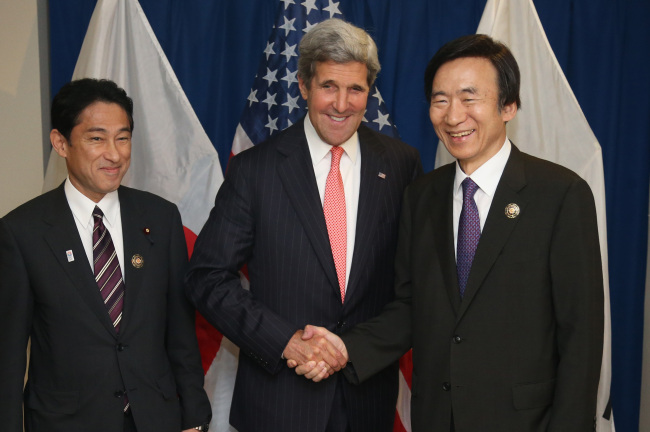BANDAR SERI BEGAWAN, Brunei ― China, the U.S, South Korea and Japan on Monday urged North Korea to relinquish its nuclear programs and return to dialogue for substantive progress.
U.S. Secretary of State John Kerry said he reaffirmed the four countries’ commitment to a nuclear-free Korea with his counterparts, urging Pyongyang to meet its obligations specified in a 2005 agreement.
He met with Chinese Foreign Minister Wang Yi shortly after arriving here for the ASEAN Regional Forum in Brunei and then held a trilateral consultation with the top South Korean and Japanese diplomats, Yun Byung-se and Kishida Fumio.
“All four of us are absolutely united and absolutely firm in our insistence that the future with respect to North Korea must include denuclearization,” Kerry told a news conference later in the day.
 |
Foreign Minister Yun Byung-se (right), U.S. Secretary of State John Kerry and Japanese Foreign Minister Kishida Fumio pose before their talks in Bandar Seri Begawan, Brunei Darussalam, Monday. (Yonhap News) |
“China made it clear to me that they have made very firm statements and very firm steps they have taken with respect of the implementation of that policy.”
After separate talks with North Korean Foreign Minister Pak Ui-chun earlier in the day, Wang once again called for a restart of the six-nation denuclearization forum also involving Russia.
“Of course China is striving for the goal of the denuclearization of the Korean Peninsula and this is our unchanged stance,” he told reporters shortly after the meeting.
“The six-party talks are vital for the denuclearization of the Korean Peninsula. China is hoping that each of the concerned countries set out to form conditions so that the peninsula issue will return to the orbit of resolution through dialogue.”
China has in recent months been piling pressure on its intractable ally to do away with saber-rattling and nuclear ambitions and come back to the negotiating table.
During their first summit last week, President Park Geun-hye and her Chinese counterpart Xi Jinping agreed that Pyongyang’s atomic development “threatens peace and stability” in the region and the denuclearization of the peninsula is in their “common interests.”
Xi and U.S. President Barack Obama also vowed not to accept North Korea as a nuclear-armed state at a meeting last month in California.
After a two-month salvo of nuclear threats, North Korean leader Kim Jong-un began displaying his desire to reengage in dialogue during his two envoys’ recent trips to Beijing.
During the three-way dialogue, Yun said South Korea, the U.S. and China have in recent months converged on their stances toward the North Korea nuclear issue.
“Facing pressure from the international community, North Korea is shifting its game plan from brinkmanship to charm offensive through which to undermine coordination between the members of the six-party talks,” he said.
Yet South Korea and the U.S deem a fresh round of six-party talks as premature yet, demanding preemptive, irreversible steps toward denuclearization.
Their chief nuclear negotiators gathered in Washington late last month and agreed on the need for stronger obligations on the North than those stipulated in its Feb. 29, 2012, agreement with the U.S. before any resumption of talks.
Under the so-called Leap Day Deal, Pyongyang agreed to put a moratorium on its nuclear enrichment program, stop atomic and missile tests and let in IAEA inspectors in exchange for 240,000 tons of food assistance.
“I’ve figured out that China has a clear position toward (North Korea’s) denuclearization,” a top government official said, citing the summit joint statement and the latest U.N. Security Council sanctions resolution.
“But there are various ways to go about it. China is the host of the six-party talks and has a viewpoint that’s not the same as ours on the North Korean issue so that it would want to resolve it through dialogue and if possible sooner than later.”
By Shin Hyon-hee, Korea Herald correspondent
(
heeshin@heraldcorp.com)








